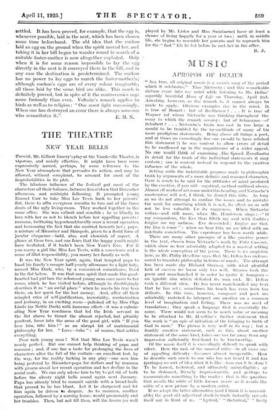THE THEATRE
NEW YEAR BELLS
Tarnish, Mr. Gilbert Emery's play at the Vaudeville Theatre, is vigorous, and noisily effective. It might have been more expressively named, perhaps, by some reference to the New Year atmosphere that pervades its action, and may be allowed, without complaint, to account for most of the improbabilities in its plot.
The hilarious influence of the festival put most of the characters off their balance, between five o'clocK that December afternoon, and midnight following. It prompted young Emmet Carr to take Miss Lee Tevis back to her parents' flat, there to affix evergreen wreaths to two out of the three doors of the ugly living-room. They worked together in the same office. She was valiant and sensible ; he so blindly in love with her as not to blench before her appalling parents : mamma, twittering hypochondriacally over a recent operation and bemoaning the fact that she married beneath her ; papa, a mixture of Micawber and Skimpole, given to a florid form of jocular eloquence—bald, also, and clownish of aspect. A glance at these two, and one fears that the happy youth might have hesitated, if it hadn't been New Year's Eve. For if you marry a girl like Miss Lee Tevis, with a conscience and a sense of filial responsibility, you marry her family as well.
It was the New Year spirit, again, that tempted papa to hand his family's meagre half-yearly allowance to a light lady, named Miss Dark, who, by a convenient coincidence, lived in the flat below. It was that same spirit that made this good- hearted bad girl lure the reformed young man once more to her room, which he has visited before, although he disobligingly describes it as " an awful place " when he meets his true love there, on her quest for the lost money. And, after all their mingled cries of self-justification, incredulity, recrimination and jealousy, in an exciting scene —polished off by Miss Olga Lindo (as Nettie Dark) with immense effect—it was a culmin- ating New Year rowdiness that led the Irish. servant in the flat above to thrust the almost rejected, but pitiably penitent, lover into the arms of the good girl, with " If you love him, lake him!" as an abrupt bit of matrimonial philosophy for her. " Love—take " : of course, that settles everything. Poor rash young man I Not that Miss Lee Tevis wasn't nearly perfect. But one cannot help thinking of papa and mamma ; and, if one has a taste for prolonging the lives of characters after the fall of the curtain—an excellent test, by the way, for the reality lurking in any play—one sees him being pestered by Micawber-papa for dollars and by mamma with groans about her recent operation and her decline in the social scale. We can only advise him to try to get rid of both before the silvery night bells sound again next January. Papa has already tried to commit suicide with a bread-knife that proved to be too blunt. Let it be sharpened and let him again be driven to despair. As to mamma, another operation, followed by a nursing home, would presumably end her troubles. Then, but not till then, will the lovers (so well played by Mr. Lister and Miss Swinburne) have at least a chance of living happily for a year or two ; until, in middle life, she begins to resemble her parents and to reproach him for the " fast " life lie led before he met her in the office.
It. J.










































 Previous page
Previous page